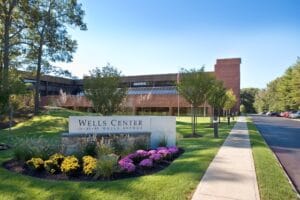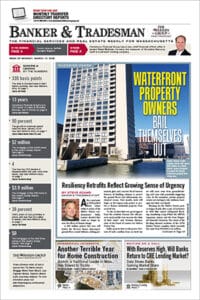
The Wells Center building at 85 Wells Ave. in Newton's Wells Avenue office park. Courtesy photo / File
Commercial building owners in Newton will be required to reduce fossil fuel use that contributes to greenhouse gas emissions or submit payments to the city.
The Newton City Council on Monday unanimously approved a new Building Emissions Disclosure and Reporting Ordinance (BERDO) that applies to moderate-sized and large commercial and residential buildings starting in 2025.
Boston and Cambridge officials enacted and updated similar ordinances in recent years, targeting the building sector’s contribution to fossil fuels use and emissions. Buildings account for over two-thirds of the city of Boston’s greenhouse gas emissions, according to city research.
The final version of Newton’s BERDO ordinance exempts owners of larger residential properties from having to retrofit buildings or submit “alternative compliance payments,” but still will have to submit building data beginning in 2026.
All told, the regulations cover approximately 20 percent of Newton’s building stock.
The requirement covers up to 103 residential buildings that are 20,000 square feet or larger with central heating systems, including apartments and condominium buildings, according to a report by Synapse Energy Economics Inc. submitted to the Newton City Council.
Another 282 commercial buildings are subject to the new regulations.
The Newton BERDO ordinance gives commercial building owners the option of submitting “alternative compliance payments” instead of embarking upon costly building retrofits. The alternative compliance payments are based upon costs to decarbonize buildings, initially set at $234 per metric ton of carbon dioxide.
The first reporting deadline is Sept. 15, 2025 for non-residential buildings 100,000 square feet and larger, while non-residential buildings 20,000 square feet and larger have until Sept. 15, 2026 to submit reports.
The Newton BERDO ordinance applies to 385 commercial properties including 41 buildings on the Boston College campus and 20 buildings owned by Lasell University.
Cambridge enacted a building energy disclosure ordinance in 2014, and most recently updated it in 2023 to encourage carbon-neutral performance for commercial buildings of at least 100,000 square feet by 2035.
Boston advanced to the enforcement phase of its own BERDO requirement in January for an estimated 6,000 buildings.
Opponents of the new regulations have warned they add an excessive financial burden upon property owners and will drive up commercial and residential rents.






